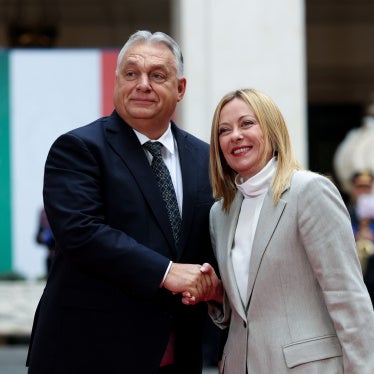The 57th United Nations Commission on Human Rights must respond to the continuing human rights crisis in Chechnya. The pattern of “disappearance,” torture, and extrajudicial and summary execution of detainees, and the use of unofficial and secret detention sites has been exhaustively documented by Russian and international human rights organizations. The mutilated corpses of some of the “disappeared” and of many other, unidentified individuals have been discovered in more than a dozen dumping grounds throughout Chechnya.
The pattern of “disappearance,” torture, and extrajudicial and summary execution of detainees, and the use of unofficial and secret detention sites has been exhaustively documented by Russian and international human rights organizations. The mutilated corpses of some of the “disappeared” and of many other, unidentified individuals have been discovered in more than a dozen dumping grounds throughout Chechnya.
Federal authorities in Russia are not committed to a meaningful accountability process. Criminal investigations into abuses by military and police forces in Chechnya have been shoddy, ineffective, and incomplete. The recent trial of a Russian colonel for the murder of a Chechen woman is the exception that shows that diligent investigations are possible, but that the political will to follow up on all serious violations has been lacking.
The federal government has not committed the necessary resources to investigations, nor are they empowering the relevant agencies to conduct them. Nowhere is the failure to investigate more obvious than in the mass “grave” at Dachny village, where at least fifty-one bodies were found beginning in January 2001. No autopsies were performed on the corpses, and the authorities have rushed to bury, rather than preserve for the purpose of further investigation, those corpses that have not yet been identified.
Chechen forces violate humanitarian law by failing to protect civilian immunity during attacks on Russian positions, by attacking civilians who work in the local administration in Chechnya, and by ill-treating and summarily executing captured Russian soldiers.
Last year the 56th U.N. Commission on Human Rights adopted a resolution on Chechnya that called on both parties to the conflict to end the abuses. It called on the Russian government to, among other things, form a national commission of inquiry to investigate allegations of violations of human rights and international humanitarian law, and to invite the relevant U.N. special mechanisms to conduct visits to the region.
The resolution represented the broadest consensus among international actors that impunity would not be countenanced in Chechnya. At the time, Commission members determined that the Russian criminal justice system should be given a chance to hold accountable those responsible for the abuses, and thus the resolution called for a national rather than an international commission of inquiry. The Russian government refused to comply with the resolution and willfully failed to implement most of its requirements. One year later, there are no effective domestic rosecutions, no national commission of inquiry has been established, and none of the national bodies set up has the capacity or the attributes required to take sufficient, effective and adequate steps toward bringing perpetrators of human rights violations to justice. It is this ongoing environment of impunity that facilitates continued, serious abuses.
Taking this into account, the Commission must now adopt a resolution that acknowledges the failure by Russian authorities to implement the resolution, renews calls for invitations to the special mechanisms, and calls for the creation of an international commission of inquiry to investigate violations of international human rights and humanitarian law.
A strong resolution is needed to send a message to the federal authorities in Moscow that the Commission is committed without reservation to preventing abuses and ending impunity for them; that the lack of cooperation experienced by the U.N. Commission and other international organizations is unacceptable; and that responding to violations of international human rights and humanitarian law in any member country is the legitimate province of the Commission. Should the Russian authorities again fail to cooperate with a resolution, then an international commission of inquiry should stand ready to commit significant time and resources to compiling an official record of the atrocities perpetrated throughout the armed conflict in Chechnya.
The victims of this conflict deserve nothing less.
Amnesty International
Human Rights Watch
International Commission of Jurists
International Federation of Human Rights Leagues
International League for Human Rights
The Memorial Human Rights Center
Medecins du Monde








